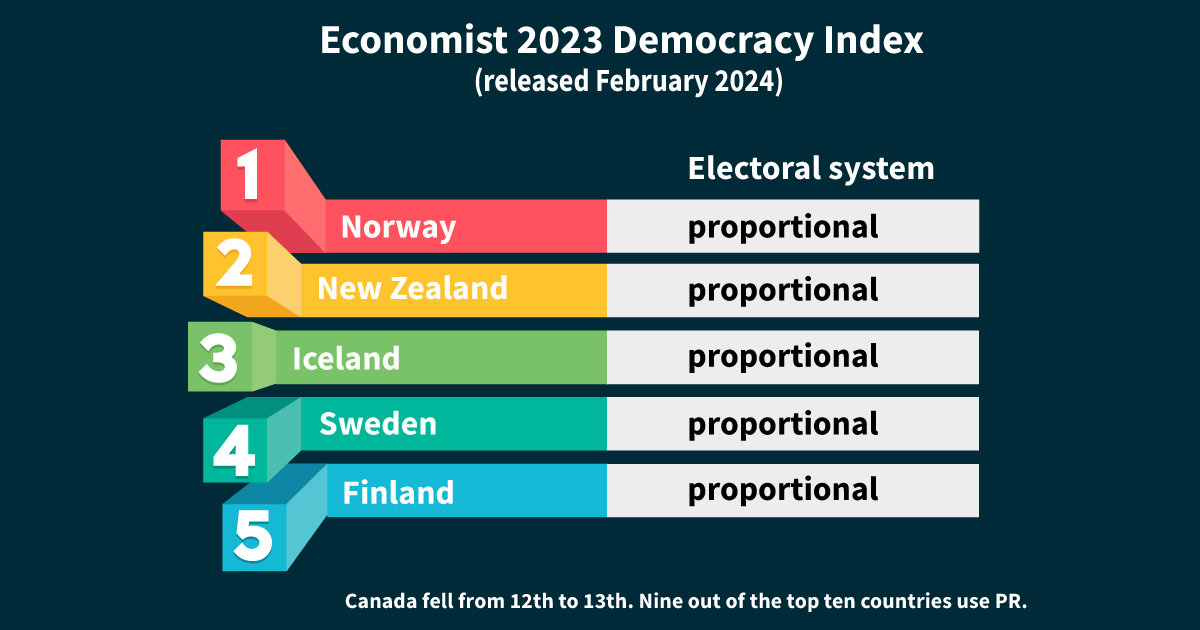
Canada’s score declines on the Economist Democracy Index: report warns of slide into American-style problems
The Economist Intelligence Unit just released its annual Democracy Index. This year, Canada has fallen again, from 12th to 13th (following a drop last year from 5th to 12th).
The top five democracies in the world―Norway, New Zealand, Finland, Sweden and Iceland―all use proportional representation.
In fact, nine of the top ten countries use proportional representation.
The report notes that the decline in the average index score for North America “was driven by developments in Canada, whose score fell by 0.19 points.”
They note that:
“Canada increasingly appears to be suffering from some of the same democratic deficits as its southern neighbour… Polarization has become a growing feature of Canadian politics…”
Just two short years ago, the 2021 Democracy Index Report issued a stark warning that our political problems are looking increasingly like those which have become entrenched in the United States:
“Is Canada becoming more like America?
The sharp decline in the North America average score in 2021 was driven mainly by a deterioration in Canada… New survey data show a worrying trend of disaffection among Canada’s citizens with traditional democratic institutions and increased levels of support for non-democratic alternatives, such as rule by experts or the military.
Canada’s worsening score raises questions about whether it might begin to suffer from some of the same afflictions as its US neighbour, such as extremely low levels of public trust in political parties and government institutions.
Unfortunately, partisan political leaders with the power to act continue to ignore what is increasingly obvious and alarming to experts and Canadians.
On February 7, the leadership of the Liberal Party and the Conservative Party lined up to block a measure to address these worrying trends when they opposed Motion M-86 for a non-partisan, independent National Citizens’ Assembly on Electoral Reform. The motion was supported by non-partisan groups including Generation Squeeze, the Samara Centre for Democracy and Apathy is Boring.
Cabinet Ministers who voted NO included those who had been in favour of a National Citizens’ Assembly on Electoral Reform in the recent past, before they became Ministers.
What was most astounding about the vote on Motion M-86, however, is that 39 Liberal MPs and 3 Conservative MPs showed courage and backbone by voting for it anyway.
It is extremely rare for so many MPs who belong to the governing party to vote differently from the Government. MPs follow the party line over 99% of the time.
Even if it’s a “free vote” and members are allowed to vote differently, the incentives and informal pressure to vote with the party team can be intense.
For example, in this Parliament, there have been 14 other votes on private member’s motions. The number of Liberal MPs who voted differently from the Government on any of them before Motion M-86 was zero.
Among the Conservatives, every MP in the Shadow Cabinet who voted (except MP Ben Lobb, who had seconded the motion), voted with the Conservative Party’s position to oppose a Citizens’ Assembly.
This included several Conservative MPs who had told constituents they were in favour of the motion, and even one MP who said she would definitely vote for it and credited the work of constituents for changing her mind.
The three Conservative MPs who voted for Motion M-86 deserve credit for prioritizing the concerns they heard in their communities over the party line.
Liberal and Conservative MPs who voted for Motion M-86 were not voting against their party or leader.
They were standing up for a fairer, more inclusive democracy.
This year’s Democracy Index found that the only region in the world to have improved their score was Western Europe. Of the 21 countries in Western Europe, only two countries have no element of proportional representation in their voting system. The scores for those countries either stayed the same or declined, meaning that the improvement came from the countries using proportional representation.
Cambridge University’s 2020 Satisfaction with Democracy Index found seven countries they described as an “island of contentment” in the storm, where satisfaction with democracy has actually increased. The authors point to well-established research showing that citizens in countries with proportional representation are more satisfied with their democracy―even if the party they supported is not in power.
In 2020, 97% of Canadians polled by Leger said that they want an electoral system where parties work together more in the common interest.
In a 2022 EKOS poll, 76% of respondents, across party lines, supported the idea of a National Citizens’ Assembly on Electoral Reform.
As MP Julie Dzerowicz stated just weeks before voting in favour of M-86:
“I think that most people think our electoral system is really due for a massive review right now.
There really is a fight to ensure we continue to strengthen our democracy, not only here in Canada but around the world.
It’s only a matter of time before we have a National Citizens Assembly on Electoral Reform in Canada.”
For the sake of all Canadians, we need our political leaders to get on with it.
